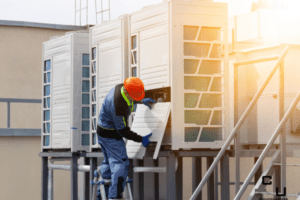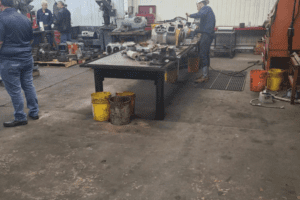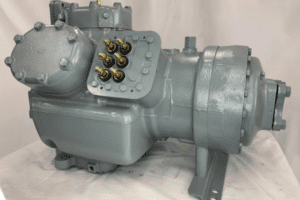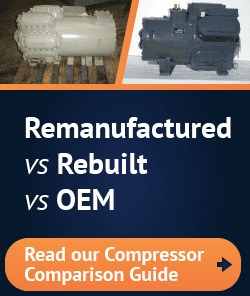

- Developing a plan to replace the compressor before performance begins to degrade
- Committing to proactive compressor maintenance that extends the unit’s service life
- Sourcing a remanufactured compressor unit as your replacement option of choice
Unlike compressors in commercial refrigeration systems, commercial HVAC compressor units, like the ones that use the Carrier 06ET275 compressors, often provide several clues before they stop working. It is not always true that signs of imminent failure are more obvious: However, their effects on the working environment can be more noticeable.
Many facilities leaders have been in a tough spot when they need to replace their commercial HVAC compressor quickly. A non-functional HVAC system can have health and productivity repercussions for the workforce, adding to the urgency of the situation.
Is Your Commercial HVAC Compressor in Danger of Burnout?
Along with the condenser, expansion valve, and evaporator, the compressor is one of the most vital components of your HVAC system. Its role is to compress refrigerant gas to a pressure that allows the system to emit hot gas and circulate the remaining cool air.
When a system experiences problems, the compressor unit is one of the first things to check. Unfortunately, many symptoms of HVAC failure are ambiguous. There could be many reasons a system is blowing warm air, for example, including low refrigerant levels.
The cause of commercial HVAC compressor failure usually comes down to three issues:
- Poor HVAC maintenance that fails to counteract the effects of vibration and mechanical wear
- Refrigerant migration, liquid flooding, and slugging that do damage to mechanical parts
- Power surges and other voltage issues that contribute to electrical failure and burnout
Let’s take a closer look at these problem areas:
1. Electrical Issues
Poor HVAC performance is often noticeable to people in the workplace, as the building can no longer be reliably kept at the desired temperature. In some cases, though, you will need to look at indirect signs of performance to get to the bottom of your compressor issue.
In situations where electrical issues are in play, a noticeable uptick in your month to month energy bills may point to compressor inefficiency. A qualified compressor technician can examine the compressor’s internal electrical connections and do any necessary repairs.
2. Liquid Flooding and Slugging
Flooding refers to the infiltration of refrigerant into the compressor’s crankcase while the unit is in operation. As this liquid refrigerant is gradually boiled off, it takes minute particles of oil with it. This robs sensitive mechanical parts of critical lubrication, adding to friction.
Slugging, on the other hand, refers to refrigerant or a combination of refrigerant and oil entering the compressor cylinder during operation. More than a dozen distinct mechanical issues can contribute to flooding and slugging.
3. Maintenance
Like any complex mechanical system, a commercial HVAC compressor benefits from regular maintenance. That includes tasks that can be performed weekly, monthly, and quarterly – as well as a full professional maintenance check done by a compressor service expert every year.
How Much Does a Remanufactured Commercial HVAC Compressor Cost?
Today’s commercial HVAC compressor units can often last 15-20 years with appropriate maintenance. That said, older models were not always built with that kind of longevity in mind.
It is a wise idea to consult your compressor documentation and begin making plans for replacement early: Around the 75% mark of the compressor’s expected lifetime or when repair bills start to increase.
The cost of a compressor unit depends on several factors, including its size, design, and features.
As a rule of thumb:
- The lowest-cost remanufactured commercial compressors cost about $1,800
- Higher-end remanufactured compressor units often range as high as $18,000
When it’s time to replace a compressor, leaders are looking for a combination of reliability, speed, and longevity. The way to save money and get all three is a remanufactured compressor.
A remanufactured commercial compressor provides a significant discount compared to new commercial compressor units ordered through the OEM. Often, this savings amounts to 30% or more of the sticker price.
Unlike a rebuilt compressor, where only parts that have failed are replaced, a remanufactured compressor goes through a complete restoration process.
This includes fully disassembling the unit, cleaning it inside and out. At Compressors Unlimited we “Go Green” when we can by requalifying some parts that continue to meet stringent standards. All other parts are replaced with new parts from a qualified provider.
A remanufactured compressor offers a faster turnaround time than an OEM compressor while delivering the performance and longevity you would expect from a completely new unit. This makes it the optimal selection for building comfort, budget, and simplifying maintenance.
Matching your compressor unit to your precise needs is the other way to minimize costs. A reputable remanufacturer will be able to advise you on making the most of your HVAC configuration. This opens the door to long-term savings, as your unit will last longer and cost less to operate.











